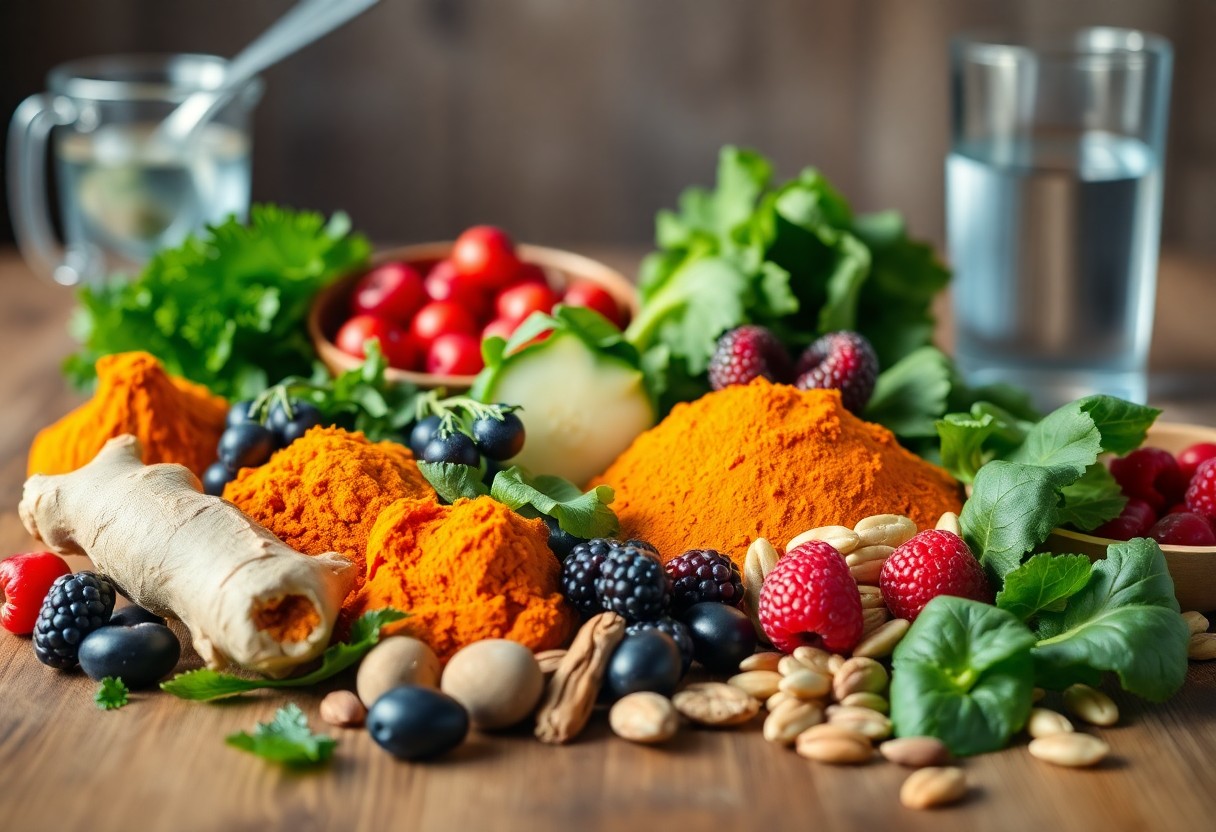It’s imperative to understand the connection between inflammation, diet, and chronic pain if you want to enhance your quality of life. Chronic inflammation can lead to various health issues, including pain in your joints, muscles, and other parts of your body. Fortunately, by making informed dietary choices, you can significantly reduce inflammation and the associated discomfort you may be experiencing.
To start, consider incorporating more anti-inflammatory foods into your diet. Foods rich in omega-3 fatty acids, such as fish, chia seeds, and walnuts, have been shown to reduce inflammation. These foods not only help in decreasing pain but also improve your overall health.
Fruits and vegetables should also be a cornerstone of your anti-inflammatory diet. Berries, leafy greens, and citrus fruits are all packed with antioxidants and vitamins that combat inflammation. Try to add variety to your meals; the wider the color palette on your plate, the more you are likely to benefit from a range of nutrients.
Whole grains like brown rice, quinoa, and oats can also play a role in reducing inflammation. Unlike refined grains, whole grains retain their bran and germ, making them rich in fiber and beneficial nutrients. Incorporating these foods into your meals can help stabilize your blood sugar levels and, in turn, help control inflammation.
In addition to foods, you might want to cut back on those that promote inflammation. Processed foods, refined sugars, and unhealthy fats are known to exacerbate inflammation. Instead of reaching for snacks high in sugars or unhealthy fats, consider opting for nuts, seeds, or yogurt for a tasty and nutritious alternative.
Stay hydrated as well. Sometimes, you might overlook the importance of water as part of your diet. Proper hydration helps in flushing out toxins from your body, which may contribute to inflammation. Aim for around eight glasses of water a day or more if you’re active, and include herbal teas as another flavorful option.
Not only does diet play a pivotal role in managing inflammation, but your overall lifestyle choices matter too. Regular physical activity, sleep, and stress management can significantly influence your inflammatory levels and chronic pain. Aim for at least 30 minutes of moderate exercise most days of the week. This can include walking, swimming, or any activity you enjoy.
Finally, consider consulting with a healthcare provider or a registered dietitian for personalized advice tailored specifically to your needs. They can guide you in planning meals that will help you reduce inflammation effectively while ensuring you get all the imperative nutrients needed for your overall well-being.
Thus, by making conscious choices about what you eat and adopting a healthier lifestyle, you can take actionable steps toward reducing chronic pain associated with inflammation. Enhanced well-being is within your power, so take charge today!
Safety comes in many forms, and one of the most significant is maintaining your health through proper diet, especially when it comes to managing inflammation and chronic pain. Understanding how what you eat influences your body can empower you to take proactive steps in enhancing your quality of life. Chronic inflammation is often linked to various health issues, including arthritis, heart disease, and even certain cancers. By making intentional dietary choices, you can potentially reduce your chronic pain and improve your overall well-being.
The first area to focus on is the incorporation of anti-inflammatory foods into your daily diet. These foods can help combat the inflammatory processes in your body. Start by adding plenty of fruits and vegetables, particularly those rich in vitamins C and E, which are known for their antioxidant properties. Brightly colored fruits, such as berries, cherries, and oranges, along with leafy greens like spinach and kale, should make regular appearances in your meals.
Another key point is to include healthy fats in your diet. Omega-3 fatty acids, found in fatty fish like salmon, sardines, and plant sources such as chia seeds, can significantly reduce inflammation. These fats help in maintaining the health of your cells and tissues, allowing for better recovery and less pain overall. Aim for at least two servings of fatty fish each week to harness their benefits.
Alongside Omega-3s, you should consider eliminating or reducing processed foods from your diet. Processed foods often contain unhealthy fats, refined sugars, and additives that can exacerbate inflammation within your body. Instead, focus on whole foods that are naturally nutrient-dense. This includes whole grains like brown rice and quinoa, which provide imperative fiber and nutrients while keeping blood sugar levels stable.
Moreover, staying hydrated is imperative for reducing inflammation. Drinking enough water helps your body flush out toxins and supports metabolic processes. Aim for at least eight glasses of water a day, and you may find it beneficial to include herbal teas, which can also have anti-inflammatory effects.
Additionally, you might want to explore the benefits of spices like turmeric and ginger in your cooking. These spices contain active compounds like curcumin and gingerol that are known for their anti-inflammatory properties. Incorporating these spices regularly into your meals can add flavor while providing health benefits.
Finally, it’s imperative to consult with a healthcare professional when modifying your diet, especially if you have existing health conditions. Chronic pain and inflammation can vary significantly from person to person, and a personalized approach will ensure you’re making choices that align with your unique needs.
By understanding the link between your diet and inflammation, you can take meaningful steps toward reducing your chronic pain. Start small, be consistent, and soon you may notice an improvement in your overall health and comfort.

Leave a Reply